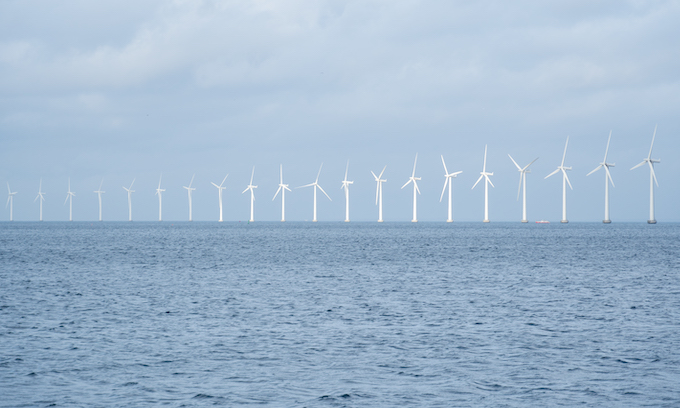A growing chorus of interest groups is calling for a pause in offshore wind activities to allow further assessment of the sector’s impacts on the marine ecosystem.
Congressman Jeff Van Drew of New Jersey, a Republican, introduced a congressional resolution on March 21 to halt work on east-coast offshore wind projects until investigations into its possible impact on marine mammals can be done.
Fishing groups and local residents have filed five lawsuits against proposed or under-construction wind projects along the Atlantic seaboard.
And the United States’ largest lobbying group for Native Americans recently called for a halt to all offshore wind scoping and permitting.
Wind energy is a key component of the Biden Administration’s climate agenda. Its goal is to generate 30 gigawatts of energy from fixed-bottom offshore wind farms by 2030, which it says could power 10 million homes, as well as 15 gigawatts from floating offshore wind infrastructure by 2035, potentially providing power to 5 million homes.
Driven by Whale Deaths
An uptick in marine mammal deaths along the north Atlantic has been cited as reason for concern.
Since December, 29 whales have died on the east coast, and 14 dead dolphins have washed ashore in New Jersey in the past month, including eight on March 21.
Van Drew believes the survey and construction work associated with wind farms, which can reportedly damage dolphin and whale hearing, may be to blame.
NOAA has said its marine mammal stranding network has not linked any of the whale deaths to offshore wind technology.
Van Drew said that the National Oceanic and Atmospheric Administration (NOAA) and the Bureau of Ocean Energy Management (BOEM) have approved “these massive construction projects right in the middle of whale feeding and breeding grounds, as well as migration routes.”
BOEM has already leased 2.3 million acres and plans to lease another 1.7 million to install an estimated 3,500 turbines on the Atlantic coast.
“We are not even in the construction stage of these industrial wind turbine grids, yet we are already witnessing a highly unusual mortality rate of these intelligent marine animals,” he told The Epoch Times.
“We need a moratorium on all offshore wind projects before this gets worse, and I have introduced a resolution calling on Congress to do just that,” he added.
House Resolution 239 states that the Atlantic offshore wind leases represent an industrialization of the oceans that has not been thoroughly evaluated and asks Congress to declare an “immediate moratorium on development” until it can “conduct investigations to determine [its] true impacts.”
“Lease areas sit along known migration routes and foraging areas of North Atlantic right whales, humpback whales, and economically important commercial and recreational fish species,” it added of concerns about the cables that will require dredging along hundreds of miles of ocean floor.
Congressman Andy Harris, a Republican from Maryland, supports Van Drew’s resolution.
“Since BOEM began authorizing testing for offshore wind project developments, we have witnessed an uptick in whale deaths,” including one recent whale death on Assateague Island in Maryland, Harris told The Epoch Times in an email.
“We need to take the time to gather proper scientific data, act in full transparency, and not rely upon platitudes for these projects, their construction, and the impact they may have upon our environment.”
Agency officials have since said an initial necropsy indicates the whale death on Assateague Island is consistent with a vessel strike, after observing blunt force trauma on the 33.8-foot female.
According to NOAA’s Marine Mammal Health and Stranding Response Program coordinator Sarah Wilkin, there has been an “unusual ongoing mortality event since 2016 that is specific to the humpback whales,” and that a similiar increase in deaths have been observed for the endangered North Atlantic right whales. Researchers are unsure of the cause of the spike in mortalities.
While no deaths have been linked to the offshore wind farms, according to NOAA, a better understanding of the potential impacts from the wind projects planned off southern New England will be crucial to protecting the endangered right whale that is increasingly using the same waters as habitat.
“Increased noise from wind turbine construction and operations and vessels could … directly impact important whale behaviors and interfere with the detection of critical acoustic cues. These types of impacts may also be associated with physiological stress and could affect the whales’ use of the region,” an agency news release said.
“The presence of wind turbine foundations may impact oceanographic and atmospheric conditions including potential changes in ocean stratification. This might alter the formation of plankton aggregations and thus foraging opportunities for right whales.”
Back to the Drawing Board
The Pacific Fishery Management Council is urging BOEM to rescind the current Oregon lease areas designated for floating offshore wind energy development in the Pacific.
The Council passed a resolution at its March 10 meeting recommending that BOEM restart the process for identifying suitable areas for installing offshore wind turbines to account for the needs of the fishing industry.
BOEM announced in April 2022 that it would lease two areas for offshore wind development off the Oregon coast. In the coming year it plans to auction 1.15 million acres starting 12 miles offshore along the south-central and southern Oregon coast.
Acknowledging the risk to marine life—including that of whales becoming tangled in the moorings and cables associated with floating wind platforms— federal agencies have commissioned more than a dozen studies of the environmental, economic, and social impact of large-scale development along the Pacific Coast.
But the Pacific coast leasing areas were selected before the studies were complete.



















“National Oceanic and Atmospheric Administration (NOAA) and the Bureau of Ocean Energy Management (BOEM) have approved “these massive construction projects right in the middle of whale feeding and breeding grounds, as well as migration routes.” In other words, two deep state, communist political organizations where the deep state clowns have no interest in protecting the environment / whales / the fishing industry. Communist organizations (NOAA and BOEM) at their finest, right “deep state” hacks?????
BUT i thought all their green push,w as to SAVE THE ANIMALS?!?!?!??!
The proponents of green energy have ignored or dismissed mny aspects of what environmental protection is all about by only focusing on one goal. But the total planet is involved, land being covered by acres of ugly solar panels, the vibrations produced by wind generation and the effect on ocean wildlife. There is the environmental destruction and polution produced in obtaining cobalt, lithium, neodymium and copper which is irreversable, not to mention the slave and child labor used to produce them. There are a lot of dirty and unsavory goings-on behind the Green New Deal which need to be faced.